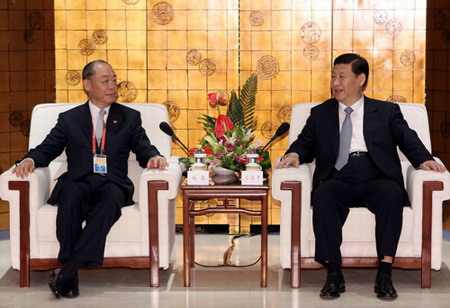ECFA to bring mainland, Taiwan closer
|
|
|
Chinese Vice President Xi Jinping (R) meets with Fredrick Chien, chief advisor of Taiwan's Cross-Straits Common Market Foundation in Hainan, on April 10, 2010. [China Daily] |
Entrepreneurs and economists of the Chinese mainland and Taiwan have considered the expected signing of a cross-Strait economic pact as a top priority in further development of their trade relations.
The long-awaited Economic Cooperation Framework Agreement (ECFA), aiming to normalize mainland-Taiwan economic ties and bring the two economies closer, is hoped to be signed by the end of June.
Fredrick Chien, chief advisor of Taiwan's Cross-Straits Common Market Foundation, said here Sunday the ECFA will be an "extremely important" agreement to strengthen future development of cross-Strait relations.
"As long as we make this stride, the cross-Strait economic and trade exchanges will get much closer," Chien said at the Boao Forum for Asia annual conference which concluded Sunday in southern island province of Hainan.
He jointly presided over a round-table meeting with Dai Xianglong, chairman of the mainland's National Council for Social Security Fund.
Dai, who is also former central bank governor, said he had been promoting cross-Strait economic cooperation since 1990 when he was general manager of the mainland's Bank of Communications.
Taiwan's Chung-hua Institution for Economic Research (CIER) has predicted that the ECFA would push the island's economic growth rate by 1.65 to 1.72 percentage points while adding 257,000 to 263,000 more job opportunities.
CIER President Daigee Shaw said Taiwan's export-oriented economy and cross-Strait marine transport will benefit from the economic pact.
Frank F. H. Lu, chairman and CEO of Taiwan's Yang Ming Marine Transport Corporation, said the ECFA will be convenient for its clients as the pact can improve logistic chains across the Taiwan Strait and promote integration of transport, customs clearance and insurance.
Christina Y. Liu, chief economist of Taiwan's Chinatrust Financial Holding Co., Ltd, said business opportunities brought by the ECFA will be continuous so as to maintain safety of cross-Strait mutual investment and trade.
She said the economy of the two sides is mutually supplementary as "the mainland has advantages in human resources, capital market and international competition, and Taiwan is very strong in research and development, designing, marketing, management and science and technology, as well as in areas of accounting, law, company management, environmental protection and medicines."
"Worries about the ECFA are unnecessary," Liu said.
Zhu Yun, president of the Beijing-headquartered China International Capital Corporation Limited, said Taiwan's high-tech enterprises can further explore the mainland market and expand cooperation area, which will help upgrade the mainland's industrial structure.
Wei Jiafu, president and CEO of the mainland's China Ocean Shipping (Group) Company, said trade, investment, shipping and logistics, among other areas, will first gain advantage after the ECFA signing.
He predicted that hundreds of thousands of Taiwan businessmen will change their mainland investment strategies after the signing of the pact, as most of them will seek long-term development in the mainland instead of the previously short-term one.
According to the Ministry of Commerce, by the end of February, the mainland had approved more than 80,000 Taiwanese-invested projects, involving nearly US$50 billion of direct investment. This makes up 5.2 percent of total overseas investment on the mainland.
The mainland remains Taiwan's first trade partner and a major source of trade surplus, with Taiwan's export to the mainland reaching US$85.7 billion last year, or 42 percent of the island's total export.
"Trade talks between countries are often based on the calculation of their own benefit. But there is no such thing during the ECFA negotiations," CIER President Shaw said. "The process is very sincere and honest."
 0
0 







